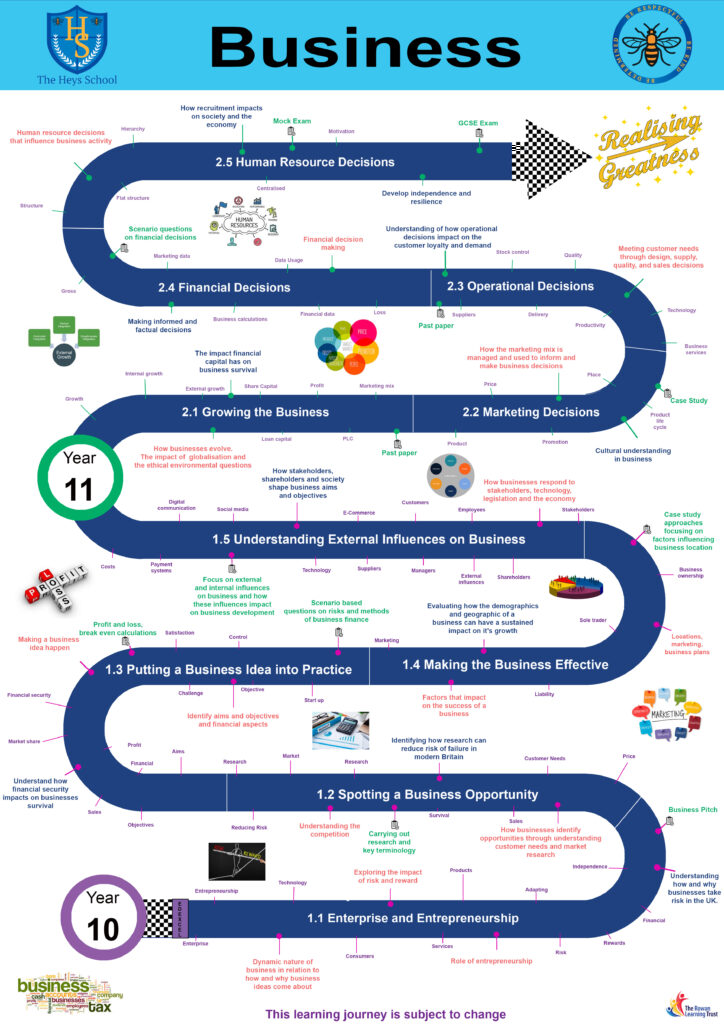
Our vision is to cultivate a generation of young entrepreneurs and business leaders who possess the knowledge, skills, and ethical mindset to thrive in the dynamic world of business. We aim to provide a stimulating and immersive learning experience that ignites curiosity, fosters critical thinking, and nurtures a passion for entrepreneurship and enterprise. Through real-world case studies, interactive projects, and practical simulations, we empower students to develop a deep understanding of the principles of business, economics, and finance. Our goal is to equip them with the confidence, resilience, and adaptability necessary to succeed in an ever-evolving global marketplace, while instilling a sense of social responsibility and ethical decision-making. By fostering creativity, collaboration, and innovation, we strive to inspire our students to become visionary leaders who drive positive change and make meaningful contributions to the business world and society as a whole.
We are committed to providing an enriching and comprehensive learning experience for our students in Edexcel GCSE Business Studies. Our intent is to equip them with the knowledge, skills, and mindset required to succeed in the dynamic world of business.
High-Quality Education: We aim to deliver a high-quality curriculum that covers essential business concepts, principles, and practices. Through engaging and interactive lessons, we will provide a solid foundation in areas such as finance, marketing, operations, and entrepreneurship.
Real-World Application: We believe in bridging the gap between theory and practice. Our intent is to incorporate real-world examples, case studies, and simulations to enable students to understand how business concepts are applied in different contexts.
Holistic Learning: We recognize that business studies extend beyond theoretical knowledge. Our intent is to develop students’ practical skills, such as data analysis, communication, teamwork, and decision-making, which are essential for success in the business world.
Personal Development: We aim to nurture students’ personal growth by promoting self-reflection, resilience, and effective time management. Our intent is to instil confidence, independence, and professionalism, preparing them for future academic pursuits and employment opportunities.
Progress Monitoring: We are dedicated to tracking students’ progress effectively. Through regular assessments, feedback, and individualised support, our intent is to provide tailored guidance that enables each student to reach their full potential.
By implementing this, we aim to inspire a passion for business studies, develop well-rounded individuals, and empower our students to become future leaders, entrepreneurs, and contributors to society.
Business Studies covers a range of topics to provide students with a comprehensive understanding of the business world. Some of the main topics covered in Tutor2u Business GCSE include:
Business Basics: This topic introduces students to the fundamental concepts of business, including different types of businesses, their aims and objectives, and the role of entrepreneurship and innovation.
Marketing: Students learn about market research, customer needs, segmentation, targeting, and positioning. They explore the marketing mix elements (product, price, place, and promotion) and how businesses develop effective marketing strategies.
Operations: This topic focuses on operations management, including production methods, quality control, capacity management, and lean production. Students learn about efficiency, the impact of technology, and effective operations strategies.
Finance: Students study financial documents and analysis, such as profit and loss accounts, balance sheets, and cash flow statements. They explore financial planning, budgeting, and the importance of financial control in business.
Human Resources: Students learn about the management of human resources in business, including recruitment and selection, training and development, motivation theories, and effective teamwork. They also explore the role of leadership and the importance of employee well-being.
Business Growth: This topic covers strategies for business growth, including organic growth, mergers and acquisitions, and strategic alliances. Students analyse the benefits and risks associated with different growth strategies.
External Environment: Students explore the external factors that can impact a business, including economic, social, technological, legal, and environmental factors. They examine the impact of globalization and ethical considerations on business decision-making.
Business Studies provides engaging resources, case studies, and exam-style questions to support student learning and exam preparation. The topics covered aim to equip students with the knowledge and skills necessary to understand and succeed in the business environment.
The topics students cover throughout Key Stage 4 are outlined in the link below:
Curriculum Overview Business – KS4 (2023-24)
Year 10 Themes/Focus
The curriculum for Year 10 provides students with a foundation in key business concepts and skills. The curriculum typically covers the following topics:
Business Activity: Introduction to the nature and purpose of businesses, different types of businesses, and their stakeholders.
Influences on Business: Understanding the external factors that can impact a business, including economic, ethical, environmental, and global influences.
Business Operations: Study of business operations, including production processes, quality control, customer service, and supply chain management.
Human Resources: Examination of human resource management, including recruitment, training, motivation, and the impact of effective workforce management on business performance.
Marketing: Introduction to marketing, market research, market segmentation, targeting, positioning, and the marketing mix (product, price, place, and promotion).
Finance: Understanding business finance, sources of finance, cash flow forecasting, income statements, balance sheets, and financial performance analysis.
Throughout Year 10, students engage in activities, discussions, and case studies to deepen their understanding of the topics covered. They also develop essential skills such as data analysis, problem-solving, critical thinking, and evaluation. The Year 10 curriculum serves as a strong foundation for further exploration and application of business concepts in Year 11 and beyond.
Year 11 Themes/Focus
The curriculum for Year 11 builds upon the foundation established in Year 10 and delves deeper into key business concepts. The curriculum typically covers the following topics:
Business Structure and Organisation: Further exploration of different types of business ownership, including sole traders, partnerships, and limited companies. Students also study the organizational structure and functional areas of businesses.
External Influences: In-depth analysis of external factors that can impact businesses, such as economic conditions, legislation, technological advancements, and competitive forces.
Business Growth: Examination of strategies for business growth and expansion, including organic growth, mergers and acquisitions, and franchising. Students evaluate the benefits, risks, and implications of different growth strategies.
Operations Management: Detailed study of operations management, including capacity management, production planning, quality assurance, and lean production techniques. Students analyse ways to improve efficiency and reduce waste in business operations.
Marketing Strategy: Further exploration of marketing concepts, focusing on the development and implementation of marketing strategies. Students learn about market positioning, brand management, promotional strategies, and the use of digital marketing channels.
Financial Management: Advanced study of financial management, including financial planning, budgeting, investment appraisal, and the interpretation of financial statements. Students evaluate the financial performance and make informed decisions based on financial data.
Globalisation and Business: Understanding the impact of globalization on businesses, including opportunities and challenges associated with international trade, global markets, and cultural considerations.
Throughout Year 11, students engage in exam-style practice questions, case studies, and critical analysis tasks to further develop their skills in applying business knowledge, data interpretation, and evaluation. The curriculum prepares students for the GCSE Business examination and provides them with a solid foundation for future studies or practical application of business concepts.

